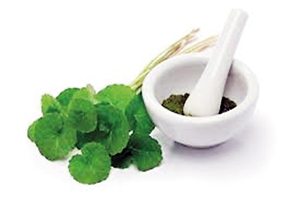Sri Lanka should tap potential of gotu kola
 Almost every culture from the ancient Egyptians to the native Americans possesses a wealth of herbal medicinal knowledge which has been passed down from generation to generation. According to the World Health Organisation, 80% of the world’s population relies on traditional herbal medicines as their primary source of health care. 74% of the modern medicines were discovered as a result of the study of plants used in traditional medicine.
Almost every culture from the ancient Egyptians to the native Americans possesses a wealth of herbal medicinal knowledge which has been passed down from generation to generation. According to the World Health Organisation, 80% of the world’s population relies on traditional herbal medicines as their primary source of health care. 74% of the modern medicines were discovered as a result of the study of plants used in traditional medicine.
The current global boom in sales of alternate herbal remedies and supplements is driven by a growing awareness for preventative healthcare methods and consumer demand for healthier and more natural products. According to Nutrition Business Journal, the COVID-19 pandemic alone has fuelled an estimated 25% increase in immunity boosting supplements in 2020, up from 8.5% growth to $3.3 billion overall.
In the face of increasing strains of microorganisms developing resistance to drugs, both Big Pharma and Big Herba are ramping up their search of the natural world for molecules they can extract and patent as new prescription drugs or market as the next best-selling ‘superfood’ supplement.
This kind of bioprospecting is by no means new. Willow bark has been used as a traditional medicine for more than 3500 years. The ancient Sumerians and Egyptians used it as a remedy for aches and pains. Detailed references are made to it in the Vedas and later by Hippocrates for its efficacy in relieving fever and pain. However, the active agent in willow bark, salicin, which would later form the basis of the discovery of aspirin, remained unknown. It was several thousands of years later, in the late 1800s, that researchers in Europe identified salicin (after Salix, the genus of the willow tree). This led to the creation of aspirin the world’s best-selling drug, by German chemist Felix Hoffmann.
Ayurveda, considered by many scholars to be the oldest healing science, that originated in India more than 5,000 years ago stems from the ancient Vedic culture. In Sanskrit, Ayurveda means ‘The Science of Life’ wherein the body, mind and consciousness work together in maintaining balance. Great emphasis is placed on prevention and encouraging the maintenance of good health through close attention to balance in one’s life, right thinking, diet and the treatment of illness through lifestyle practices and the use of herbal remedies.
In Sri Lanka, ‘Ayurveda’ used to denote collectively all the traditional medical systems, encompasses Ayurveda, the predominant system which came to the island from India with Buddhism 2,500 years ago, Siddha, Unani, and Deshiya Chikithsa. Deshiya Chikithsa is the earliest system of medicine in Sri Lanka and existed before the advent of Ayurveda. The term “traditional medicine” thus largely overlaps with the term “Ayurveda”.
Stone scripts as early as 250 BCE, ancient texts together with remaining ola palm leaf texts, offer an insight into the intricacies of traditional food preparation which are based on ancient Ayurvedic principles of health. The nutritional basis of ingredients, methods of preparation and their suitability for consumption depending on the patient’s physiological condition, as well as the environment and climate, are intricately interwoven.
Centellia Asiatica, a small perennial herb native to Asia and naturalized in many parts of the world including the US and Africa is mentioned in ‘Sushruta Samhita’, one of the earliest Ayurvedic medical texts, and has been famed for its Ayurvedic medicinal properties. In traditional Chinese herbal medicine, it is known as one of the “miracle elixirs of life” and in India, is sometimes referred to as “Tiger Grass” due to the fact that wounded tigers would roll themselves in it. Here, it is most often referred to by its Sinhalese name “gotu kola.”
Long before the term “superfood” was coined, gotu kola was referred to in Ayurveda as the “herb of longevity”. In Ayurvedic medicine it is famed as a “medhya rasayana”with a rejuvenative effect on nerves and brain cells, that improves brain function, boosts memory and prevents cognitive deficits. It is also known as a powerful wound and skin disease healer and a blood purifier with gastroprotective qualities.
Its remarkable cognitive, neurotropic and neuroprotective effects highlight its potential to modulate disease processes involved in neurodegenerative disorders such as Alzheimer’s, Parkinson’s and Huntington’s disease in addition to treating conditions such as schizophrenia, epilepsy and strokes.
The WHO has recommended that medicinal plants be used more effectively in healthcare. Sri Lanka is uniquely positioned to utilise and market its own natural resources in the pursuit of global public health. There is very real global demand and there is a very real opportunity.
| Health benefits | |
Alone or in combination with other nootropics, of which Sri Lanka has several, a simple decoction of fresh or dried gotu kola leaves, leaf-based juices, extracts in the form of tinctures and capsules of dried powdered leaf, offer an array of proven health benefits:
|


